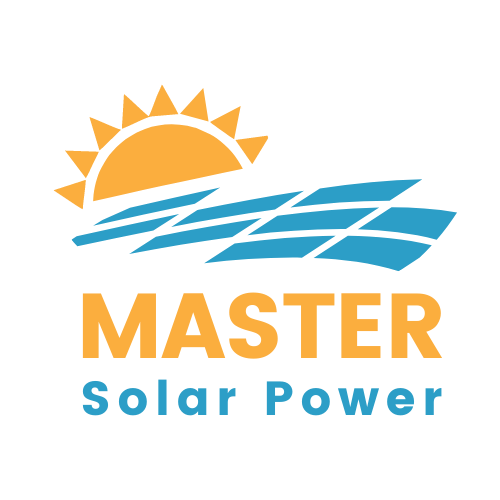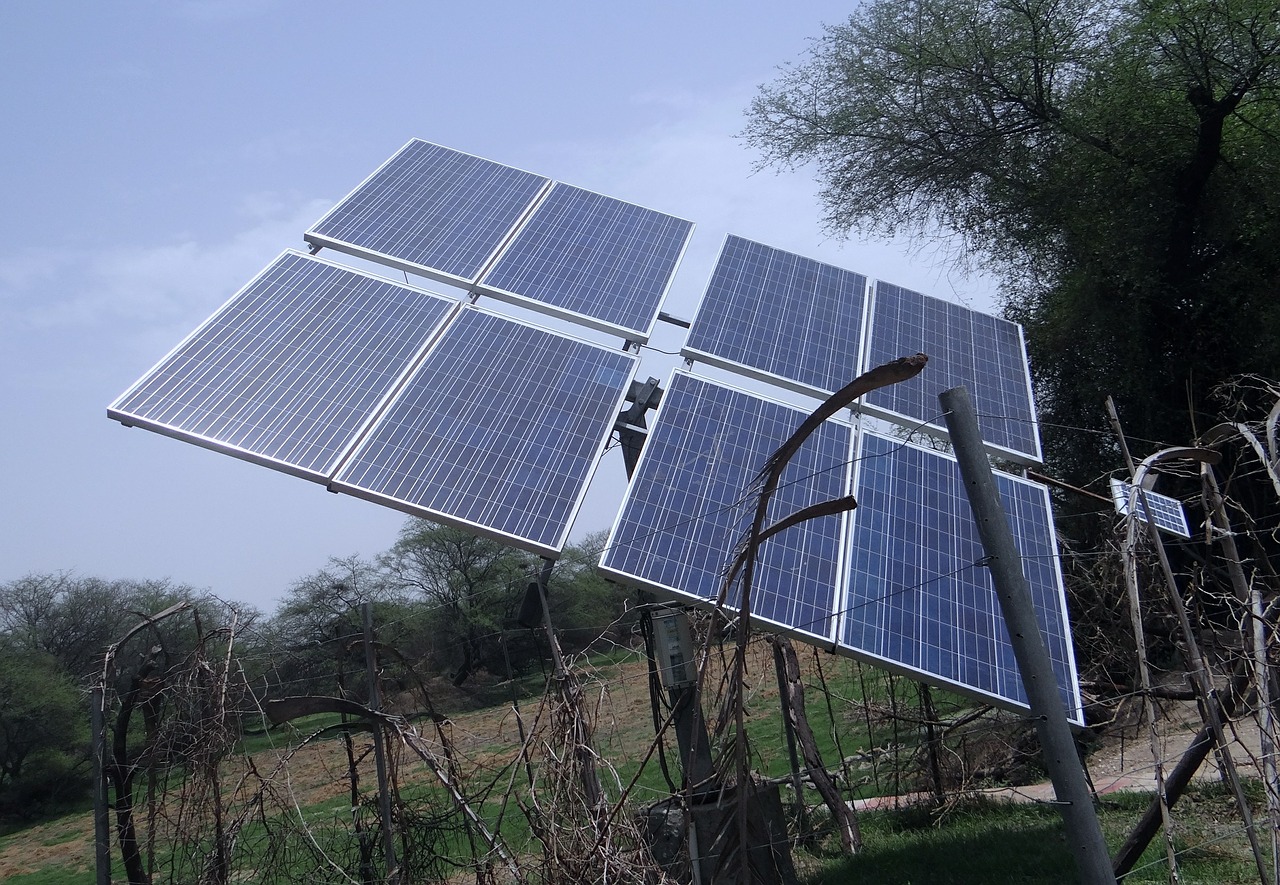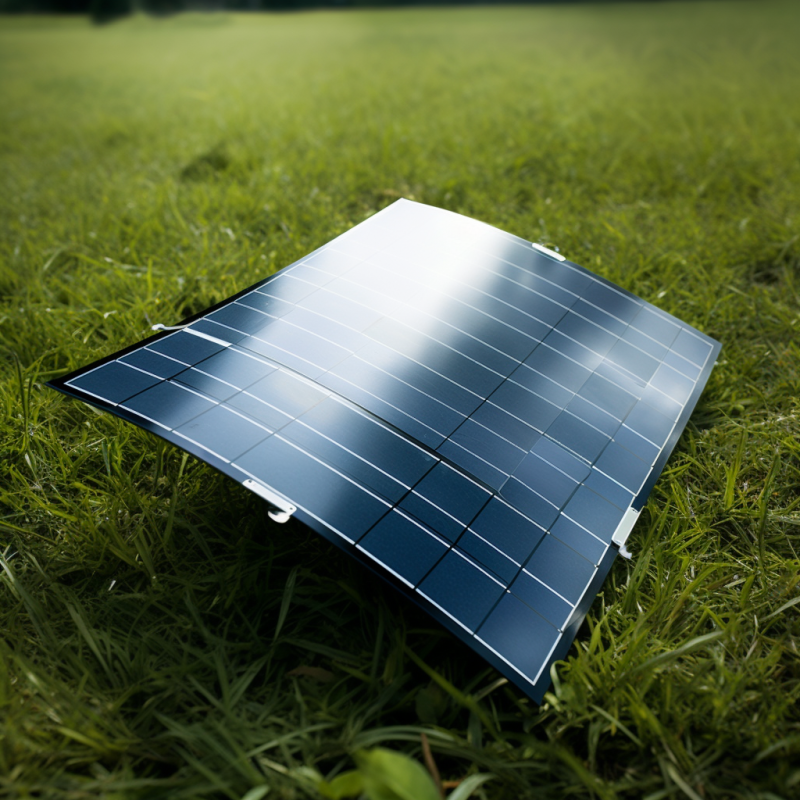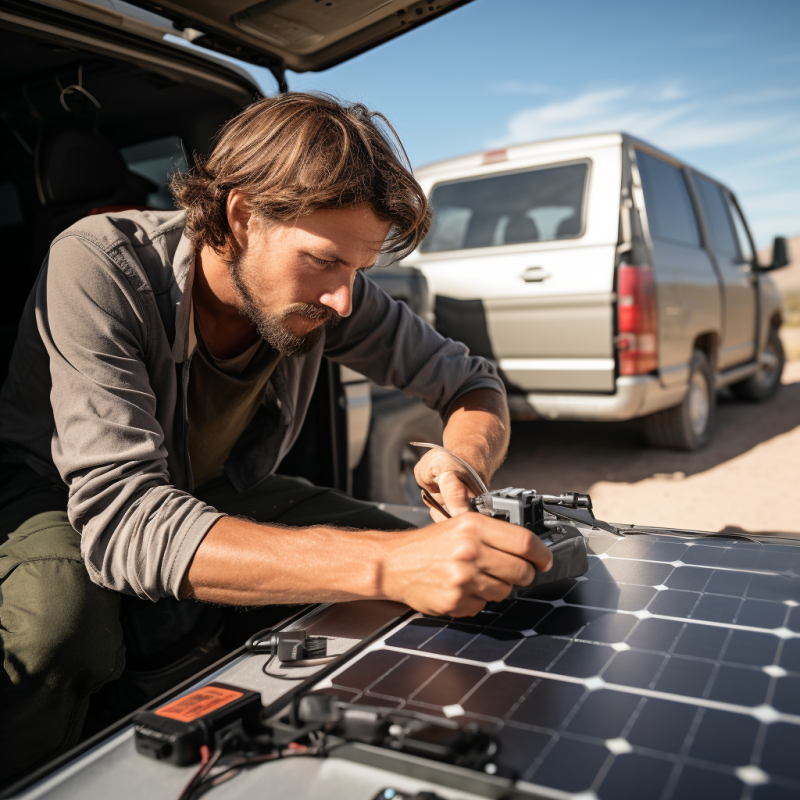We get commissions for purchases made through links in this post. We still remain objective in our reviews, though. Thank you for your support!
If you want to know how to set up a solar array, there are a few things you need to do before getting started. In this article, we will go over the basics of how to set up solar panels off-grid, from choosing the right equipment to wiring and mounting your system.
We will also discuss some of the benefits of going off-grid with solar power.
The first thing you’ll need to do when setting up solar panels off-grid is to choose the right equipment. You’ll need to determine how much power you need, and then find a solar panel that can generate that amount of electricity.
You’ll also need to purchase batteries to store the electricity generated by the solar panel, as well as a charge controller to regulate the flow of electricity from the solar panel to the batteries.
Once you have all of the equipment, you’ll need to wire and mount your system. This can be done yourself if you’re handy with tools, or you can hire a professional to do it for you.
Either way, it’s important to make sure that the system is installed correctly, as a faulty installation can lead to problems down the road. But first, we have to discuss why you need to have an off-grid solar energy system in the first place.
In this post, we'll discuss:
Why do you need a solar power system?
The steady rising of fossil fuels and their lethal effects on our planet has led scientists, researchers, and inventors to explore other renewable energy sources. Solar power is one of the most widely used renewable energy sources in the world.
Solar panels are devices that convert sunlight into direct current (DC) electricity. They are composed of photovoltaic cells that absorb sunlight and generate voltage when exposed to light.
The DC electricity can then be converted into alternating current (AC) electricity, which is the type of electricity used in homes and businesses.
There are many reasons to install a solar power system.
Some of the most common reasons include:
- reducing your carbon footprint
- saving money on your electricity bill
- being more self-sufficient
- having power in emergency situations
Let us discuss these benefits thoroughly:
If you want to protect the environment, one of the best ways to do so is by installing an off-grid system. Solar energy is a renewable resource that doesn’t produce any harmful emissions, making it a great way to generate electricity without harming the planet. This can immensely benefit your family members who have respiratory problems.
Another benefit of an off-grid solar system is reducing your monthly electricity bills. Since you are generating your own electricity, you no longer have to pay for the power that you consume.
In some cases, your solar system may even produce more electricity than you need. In this case, you can sell the excess electricity back to the grid and earn money.
If you live in an area where there is not enough sun to power your entire home, an off-grid solar system can still be beneficial. You can use the system to supplement your existing electrical supply.
You won’t need to rely on fossil fuels or the grid to power your appliances anymore. Instead, you will be producing your own power supply from your off-grid solar systems.
Finally, having reliable off-grid systems can provide you with power during emergency situations. The destruction brought by numerous calamities can severely affect the lives of people.
If you have an off-grid solar system, you can still have access to power and energy even if the grid is down. This way, you can continue with your daily activities and maintain some sense of normalcy during difficult times.
Your business can also benefit from solar power systems. Even if there is a power outage brought by natural calamities, your business can still operate. This is essential for companies that provide services that are critical to the public.
Solar power is also a great investment; it can increase the value of your home and make it more sellable.
Additionally, solar panels require little maintenance, so they are a good choice for people who do not have time to spend on upkeep. If you are interested in installing a solar power system, keep reading to learn how to get started.
How much does a solar system cost?
The cost of a solar energy system varies depending on the size and type of system you choose.
For a 1,500 square foot home with a 6kW solar panel system, the national average cost for solar panel installation is $18,500.
Residential solar panels range in size from 3kW to 8kW and cost between $9,255 and $28,000 in all installation expenses.
An off-grid solar system is a great option for homes that are not connected to the electric grid.
Off-grid solar systems can provide power for lights, appliances, and even heating and cooling.
Off-grid solar systems typically use a battery bank to store energy collected from the solar panels.
The cost of an off-grid solar system varies depending on the size of the system and the type of batteries used.
If you are interested in installing a solar energy system, contact a local solar installer for more information.
What do I need to have a good off-grid solar system?
Frankly speaking, you need to spend money to have good off-grid systems that would supply your home or business with the electricity that you need. Your system would require a storage battery, solar panels, and an off-grid inverter.
The solar array size that you install will depend on how much electricity you need on a daily basis. If you are using this system to power your home, you should consider installing a larger solar array.
The best way to set up your off-grid solar system is to mount the solar panels on your roof. This will help maximize the amount of sunlight that the panels can collect.
You should also try to position the panels so that they face south, which will provide the most direct sunlight possible. If you are unable to mount the panels on your roof, you can always install them in your yard or in a nearby shed.
Once you have installed the solar panels, you need to connect them to an inverter. The inverter will take the DC power from the solar panels and convert it into AC power, which can be used by your appliances.
You also need to install a storage battery in your system. The storage battery will store excess electricity generated by the solar panels so that you can use it at night or on cloudy days.
You should also consider installing a backup generator in your off-grid system. The generator will provide you with electricity in case of an emergency or if your solar panels are not generating enough power.
Installing an off-grid solar system is not a difficult task, but it is important to make sure that you have all of the necessary components. This way, you can be sure that your system will work properly and provide you with the electricity that you need.
What are the good brands of solar panels for my off-grid solar system?
Solar panels have become the face of the solar array. It is where the sunlight is absorbed which in turn becomes usable energy. This is the key reason why homeowners are now more interested in installing solar panels on their rooftops.
Aside from that, solar panels also help reduce our dependence on fossil fuels and save us money in the long run. In this article, we will be discussing the different brands of solar panels that you can use for your off-grid solar system.
There are a lot of factors you need to consider when choosing the right solar panel for your home. But don’t worry, we’ll walk you through everything you need to know to make an informed decision.
The solar panel you select will have a big impact on your overall system, so it is important to make sure that you choose a good quality brand. Here are some of the best brands of solar panels:
SunPower
Solar panels with a peak efficiency of 14.2 percent are produced by SunPower, making them a popular choice for both home and business installations.
They are also more cost-effective than customers may anticipate.
While the temperature sensitivity of SunPower panels may be less than those from other manufacturers, they are excellent for projects that need to maximize their available area.
Renogy
Renogy solar panels are made out of monocrystalline silicon, which means it has a higher conversion rate.
You won’t have to worry about running out of power for off-grid applications because their solar cells are so efficient.
You can power your RVs, boats, and small cabins with a single 100-watt solar panel. But if you’re a high-energy user, you can use two panels.
Panasonic
Panasonic has a long history of producing many electronics used in American homes.
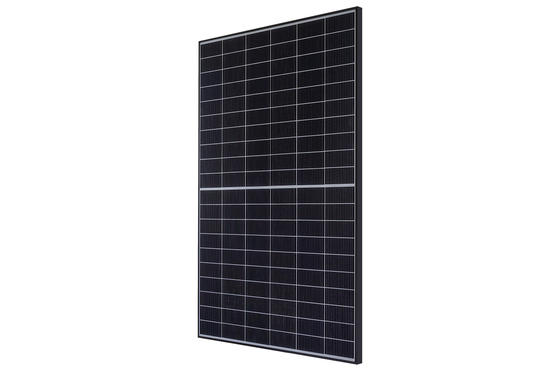
Many consumers are unaware that Panasonic has been a pioneering force in solar energy since the 1970s.
In a recent announcement, Panasonic revealed that they will be outsourcing their solar panel manufacturing in order to pay more attention to alternative energy solutions.
Panasonic solar panels are available for both commercial and residential customers. They may still buy Panasonic solar panels with the same level of confidence in quality, efficiency, and a 25-year warranty that far surpasses expectations.
What are the good brands of solar charge controllers that I need for my off-grid solar system?
A solar charge controller is an essential part of any off-grid solar system. It helps regulate the flow of energy from your solar panels to your battery bank, ensuring that your batteries are always getting a full charge.
In addition, a solar charge controller also helps protect your batteries from overcharging, which can damage or even ruin them. It can also tell you about your power usage or power consumption.
There are a lot of different solar charge controllers on the market, so it can be tough to decide which one is right for you. Here are some of our favorites:
Renogy
The Renogy Wanderer Solar Charge Controller is the first product on this list, and it’s one of the most cost-effective solutions available – a Bluetooth module.
With the help of its Bluetooth module, you may simply keep track of your solar panel settings. Its maximum current capacity, on the other hand, is low at just 10A.
Fortunately, this low-cost solar charge controller may still be a viable alternative for many people, as it supports both 12V and 24V solar panels and batteries.
This solar charge controller is a portable charge controller with USB ports that allows you to charge your phone or tablet easily. Unfortunately, because it’s a low-cost solar charge controller, there are no warranties offered.
SolarEpic Epever
Despite its high price, the Epever MPPT Solar Charge Controller is one of the most powerful choices on the market today. This solar charge controller may be linked to your computer using the provided cable for stress-free monitoring.
The highest current rating of this solar charge controller, though, is 40A.
Because this is a high-performance solar charge controller, it can power both 12V and 24V solar panels for versatile operation.
Aside from its excellent construction quality, another feature that comes with this premium charge controller is the 2-year warranty. This feature allows you to expect it to last for a long time.
Victron Energy
The Victron Energy SmartSolar MPPT Solar Charge Controller is considered one of the most dependable charge controllers available in the market these days.
It also has Bluetooth, just its previous iteration. But this one’s maximum current rating is higher than the last one by a significant amount.
This solar charge controller has an overall rating of 90 Amps and is compatible with any 12V or 24V solar panel.
The fact that this solar charge controller has a 3-year guarantee, as well as excellent build quality, is no surprise considering its premium price tag.
What are the good brands of batteries that I need for my solar power system?
When it comes to solar setups, most people think that car and bike batteries would be enough to store solar energy. However, this is wrong. The fact is, you need good-quality batteries if you want your solar power to work efficiently.
The best quality batteries for solar setups are deep-cycle lithium batteries. These batteries can store large amounts of energy and can be discharged and recharged multiple times without damaging the battery. They are also relatively affordable compared to other types of batteries.
If you are looking for a good brand of lithium-ion deep-cycle battery, we have prepared a shortlist of the best ones in the market today. They make the best quality deep-cycle batteries and they have a wide range of products to choose from.
So, if you are thinking about setting up a solar power system, are some of the good-quality battery brands to consider:
Renogy
Renogy is a solar energy business that creates high-quality and highly-efficient batteries that are now considered to be among the finest in the market.
Their deep-cycle gel batteries are designed with off-grid solar power in mind. With every configuration, they will give you the most battery capacity possible.
You don’t need to check the battery’s condition or keep an eye on it since it is a pure gel battery. This way, you have more time to do other things in your life.
Battle Born
The Battle Born LiFePO4 12V is a lithium-ion battery that is both safe and powerful. These batteries have a longer life and do better than any other deep cycle battery in the market today.
The 100 Ah LiFePO4 12 battery is 100% made in the United States and can be used as the best battery for a solar energy system.
VMAXTANKS
The VMAXTANKS battery is a deep cycle absorbed glass mat (AGM) battery that is among the top solar batteries on the market. It’s one of the most popular deep-cycle batteries in the field of solar storage.
This heavy-duty AGM battery, which has a lifespan of between 8 and 10 years, offers additional characteristics such as a 3000 to 5000 discharge rate, smooth operation in high-temperature settings, and a quick recharge rate.
Finally, this battery has a warranty of 8 years. If you have some issues, you can rely on its warranty for technical assistance or a replacement.
What are the good brands of pure sine wave inverters for my solar array?
To run your home appliances, you need a trustworthy pure sine wave inverter. The best brands are often more expensive, but they can provide you with years of service.
When shopping for an inverter, be sure to consider the wattage rating. This will help you determine how many appliances you can run at once. You also need to make sure the inverter is compatible with your solar panels.
Choosing the right inverter is important if you want to take advantage of solar energy. By investing in a quality product, you can ensure that your appliances will run smoothly and efficiently.
Here are some of the best pure sine wave inverter brands in the market today:
Renogy 2000 Watt Pure Sine Wave Inverter
The Renogy 2000 Watt solar inverter has been created with excellent quality in mind, and we feel it will give you the best value for your money.
Its surge capacity is 100%, so it’ll easily handle the majority of your appliances (fans, grinder, lights, CPAP machine, battery chargers, coffee makers, blenders, etc).
The Renogy pure sine wave inverter is simple to set up and includes four AWG wires as well as a remote controller.
It costs $300, which is a great price for this product.
Customers have praised the product’s overall quality, which they say is of exceptionally high standards for the price.
GoWise
GOWISE offers one of the most effective low-watt pure sine wave inverters available. Let’s see what this product has to offer:
Like all things produced by this firm, you can anticipate a 1-year guarantee, so keep that in mind if anything goes wrong with your inverter, you can ask the company for assistance or replacement.
This is a versatile energy source that can be used to charge small electronics, such as e-bike chargers, laptop chargers, and other crucial devices.
If you are looking for ways to save money, this product is the best choice for you (although some requirements may vary).
SolarEdge
The SolarEdge HD-Wave Single Phase Inverter is compatible with SolarEdge Power optimizers. It includes a built-in DC with protection against sudden high voltage, quick shutdown, and a standard 12-year warranty that can extend up to 20-25 years.
This inverter contains a cutting-edge power conversion technique based on distributed switching and powerful DSP technology. The inverter can generate a clean sine wave, resulting in a significant decrease in the magnetics and massive cooling components.
The inverter is small and compact, making it easy to ship and store. SolarEdge’s 99% efficiency allows for greater solar power production.
Finally, the SetApp application for inverter commissioning can be done using a smartphone.
What are the benefits of off-grid solar systems?
One of the things that make people hesitate to have an off-grid solar energy system is the fact that they do not have any idea about its benefits.
Here are some of the advantages that you can get from this type of solar array.
1. You will not have to worry about power outages.
One of the main benefits of having an off-grid solar system is that it can provide you with power even during power outages. This is because Off-grid systems are not connected to the main grid, meaning that they will still work even if there is a power outage.
This means that you will not have to worry about being left in the dark or being without power for an extended period of time.
2. You can save a lot of money in the long run since you will not have to pay for electricity.
Another great benefit of off-grid solar systems is that they can save you a lot of money in the long run. This is because you will not have to pay for electricity, which can end up costing you a lot of money each month.
3. You can help the environment by using renewable energy sources.
You can also help the environment by using renewable energy sources. This is because solar power does not produce any greenhouse gases, which can be harmful to the environment.
It also doesn’t produce noise which can be stressful not only to you but to animals around your home.
4. You will have a backup plan in case of emergencies.
Having backup power in case of emergencies is good. This is because off-grid systems are not connected to the main grid, meaning that they will still work even if there is a power outage.
This means that you will not have to worry about being left in the dark or being without power for an extended period of time.
5. You can live a more comfortable life since you will not have to worry about the cost of your electricity bill.
Allocating a significant amount of money for monthly power usage can be stressful, especially if you have so many things to pay for. However, if you have an off-grid solar system, you can live a more comfortable life since you will not have to worry about the cost of your electricity bill. This is because you will not be using the main grid, which can be expensive.
6. You are in control of your power consumption.
With an off-grid solar system, you are in control of your power consumption. This means that you can use as much or as little power as you want without having to worry about the cost. You can also decide when you want to use power and when you want to conserve it.
7. Off-grid systems are low maintenance.
Another great thing about off-grid systems is that they are low maintenance. This means that you will not have to worry about regularly checking and maintaining your system. This also means that you can spend more time on things that need your immediate attention.
8. They are easy to install.
Installing an off-grid solar system is very easy, especially if you have the help of a professional. You can also find many instructional DIY off-grid solar videos online that can help you with the installation process.
9. They are scalable.
Off-grid systems are also scalable, which means that you can add more panels depending on how much power you need. This is unlike grid-tied systems where you are limited by the amount of power that the grid can provide.
10. They provide independence from utility companies.
Another great thing about off-grid solar systems is that they provide independence from utility companies. This means that you will not have to worry about power outages or blackouts. You will also not have to pay monthly fees to the utility company.
These benefits have helped people lead sustainable lives and be more prepared for different eventualities. If you are looking for a way to live sustainably or be prepared for different eventualities, then an off-grid solar system may be the right choice for you.
Frequently Asked Questions
How do I set up an off-the-grid solar system?
Setting up an off-grid solar system is easy; you just need to have the right components. You will need solar panels, batteries, a solar charge controller, an inverter, and a few other miscellaneous items.
You can set it up yourself by learning DIY off-grid solar video instructions, or you can save a lot of effort by hiring a contractor to do it for you.
How big of a solar system do I need to go off-grid?
To know how big of a solar system you need to go off-grid, you must first determine how much energy you need. You can determine it by computing your average power consumption. One way to do so is by looking at your monthly electricity bills.
How much does it cost to set up off the grid?
Setting up an off-grid solar power array is not cheap. However, you should know that the prices of solar-based technologies go down every day.
You can expect to pay anywhere from $45,000 to $65,000 for a new off-grid solar system (without state incentives, rebates, or tax credits), based on the average amount of energy you will need.
How do you build an off-grid system?
Building an off-grid system can be very tricky, especially if you do not know how to get started. The most important thing you need to know is what components are required and how they interact with each other.
The first step is to determine how much power you will need to generate. This will be based on your daily energy use and the amount of sun that hits your property. Once you know how much power you need, you can begin shopping for solar panels. It is important to purchase quality panels that will offer a long lifespan and high performance.
After your solar panels are installed, you will need to connect them to an inverter. The inverter converts the DC power from the panels into AC power that can be used by your home. You will also need to connect the inverter to batteries, which will store the energy generated by the panels for use when the sun is not shining.
Now that you have all of the components, you will need to wire them together. This can be a very difficult task, so it is important to get help from a professional if you are not confident in your abilities.
After your off-grid system is installed, you will need to maintain it to ensure that it continues to work properly. This includes regularly checking the batteries, solar panels, and inverter for any damage or wear. You will also need to clean the panels on a regular basis to ensure that they continue to generate power effectively.
Can I install my own off-grid solar system?
Yes, you can install your very own off-grid solar system.
Can off-grid solar systems run an air conditioning unit?
Yes, you can urn your air conditioning unit through your off-grid solar energy array.
The energy consumption of air conditioning units is very high, with each unit using roughly 3.5 kWh per hour while in operation. That implies that each solar panel will be able to run your air conditioner for around 8.5 hours.
If you use your air conditioner for 6 hours each day, you’ll need more than 21 100-watt solar panels to power 180 hours of usage per month. If you have a smaller solar system, limit your A/C usage or quit using it.
How to set up solar panels in an off-grid setting?
If you are going to set up solar panels in an off-grid setting, here are some of the things that you need to prepare:
1. You need a sunny spot to put your solar panels.
2. You need to calculate how many solar panels you need and what size of battery bank you will require.
3. You need a way to get the electricity from the solar panels into your houses, such as through a transfer switch or an inverter.
4. You will also need batteries or a battery bank to store the energy from the solar panels during the night or on cloudy days.
5. You may want to buy a charge controller to protect your batteries from overcharging.
6. You will also need some wiring and connectors to hook everything up.
7. Finally, make sure you have a good understanding of how off-grid solar works before installing your own system.
Conclusion
Setting up solar panels for off-grid settings is not as complicated as it may seem. With careful planning and execution, you can have your own solar energy system up and running in no time. Just be sure to do your research, consult with experts, and follow the proper steps to ensure a smooth installation process.
If you’re considering going solar, be sure to read our complete guide on how to install solar panels off-grid. With our tips, you will be ready to start generating your own clean, renewable energy.
